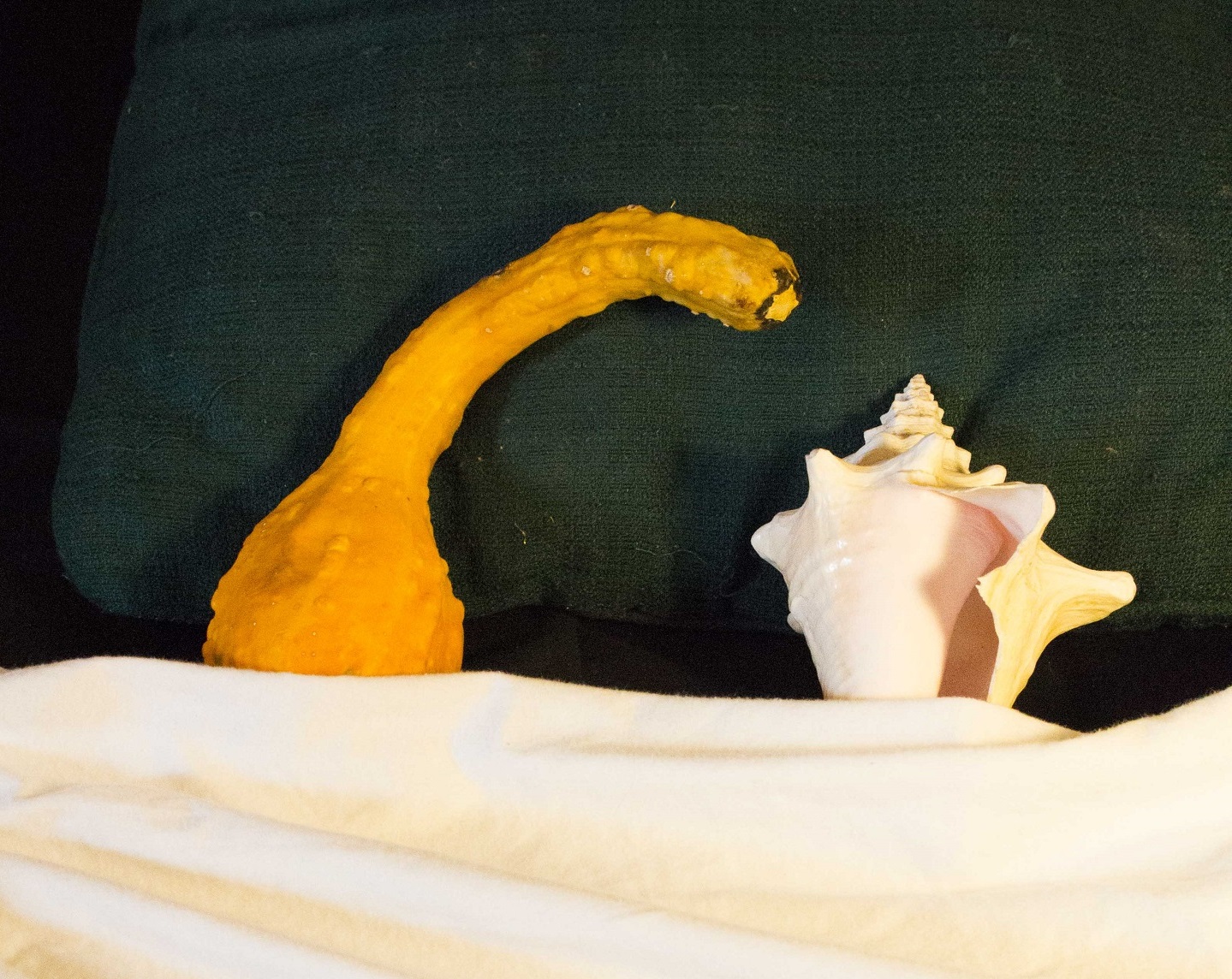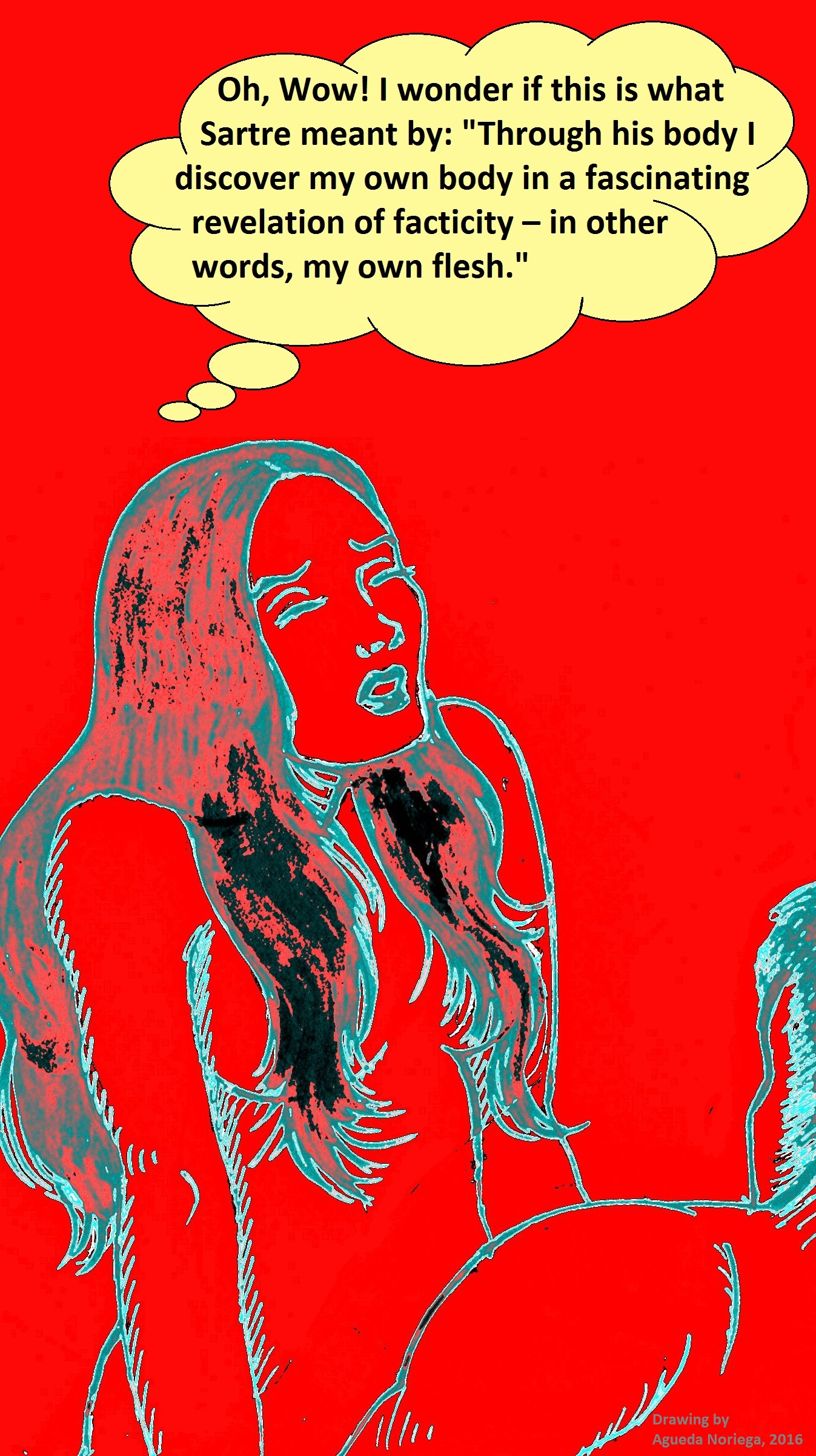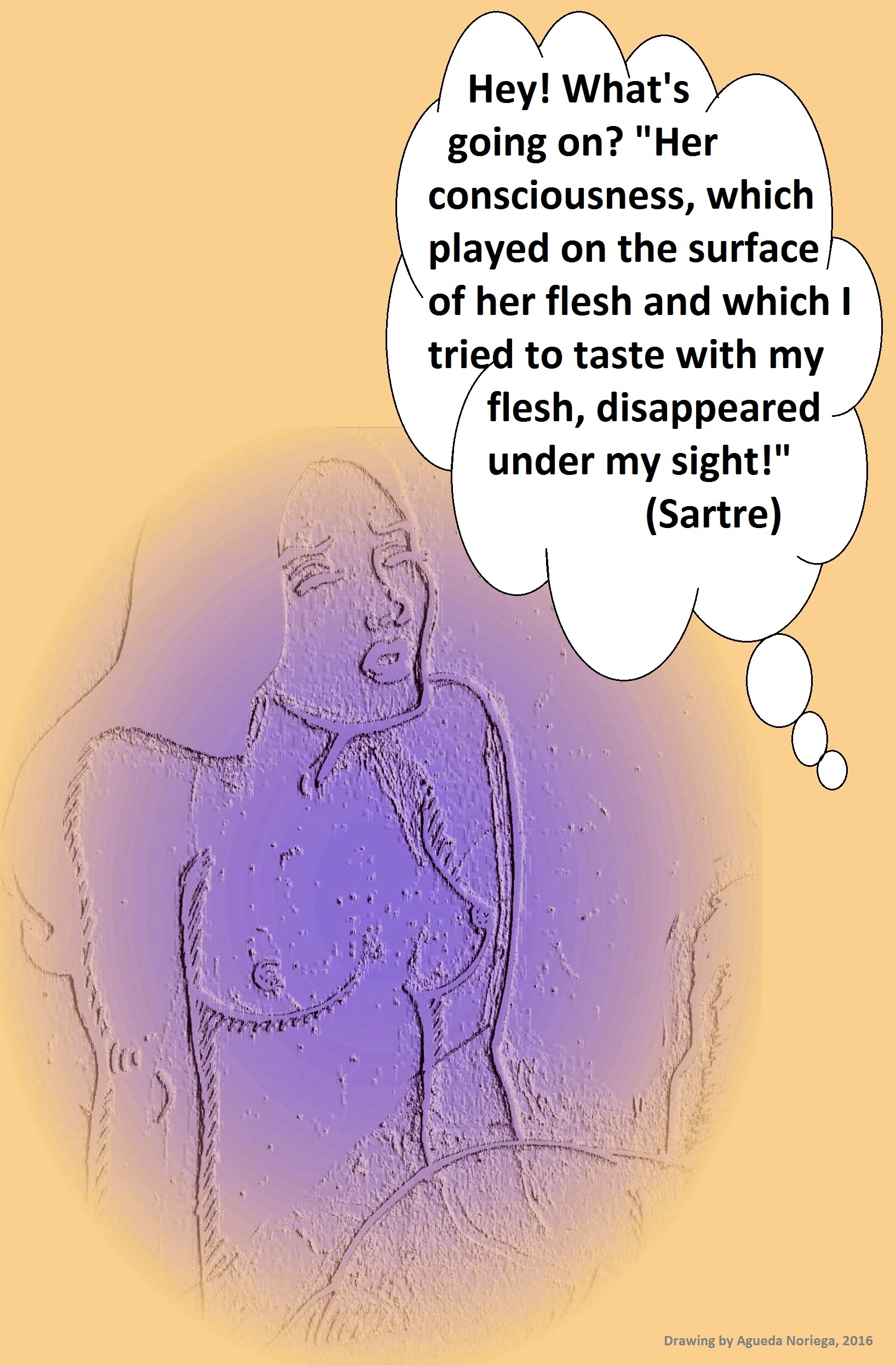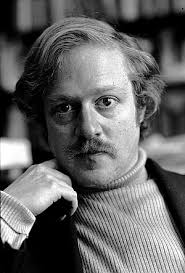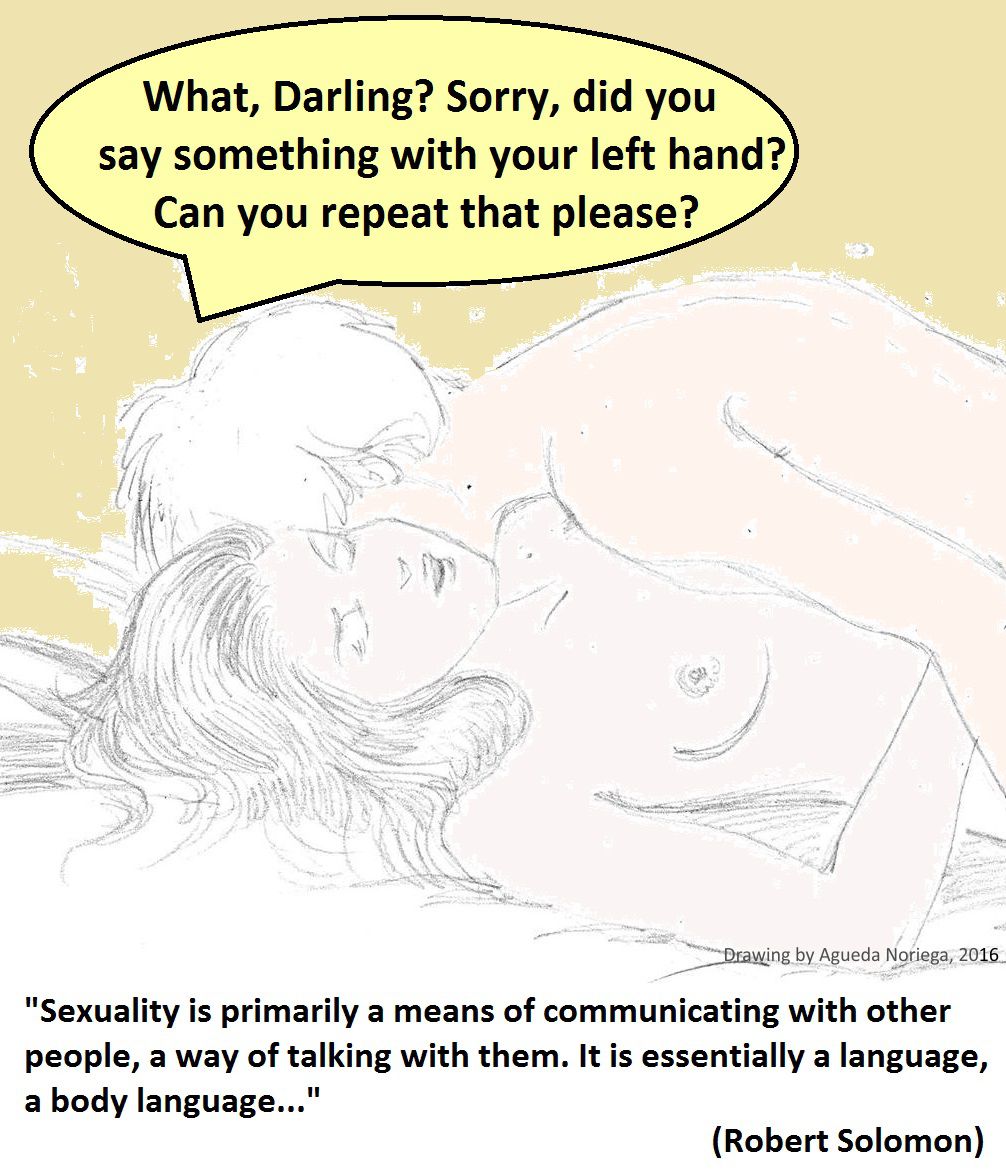|
AGORA - Philosophical Topics Important thinkers on important life-issues |
- Attitudes
- Authenticity
- Death
- Philosophizing
- Friendship
- Beauty
- Happiness
- Inner Freedom
- Inner Truth
- Love
- Meaning
- Music
- Right & Wrong
- Romantic Love
- Sex
- Solitude
- Sublime
- The Other Person
This month's topic: SEX
What is the meaning of sex?
WEEK 1 - Sartre WEEK 2 - Solomon WEEK 3 - De Beauvoir WEEK 4 - Bataille SIMONE DE BEAUVOIR
Male and female sexualities shaped by society
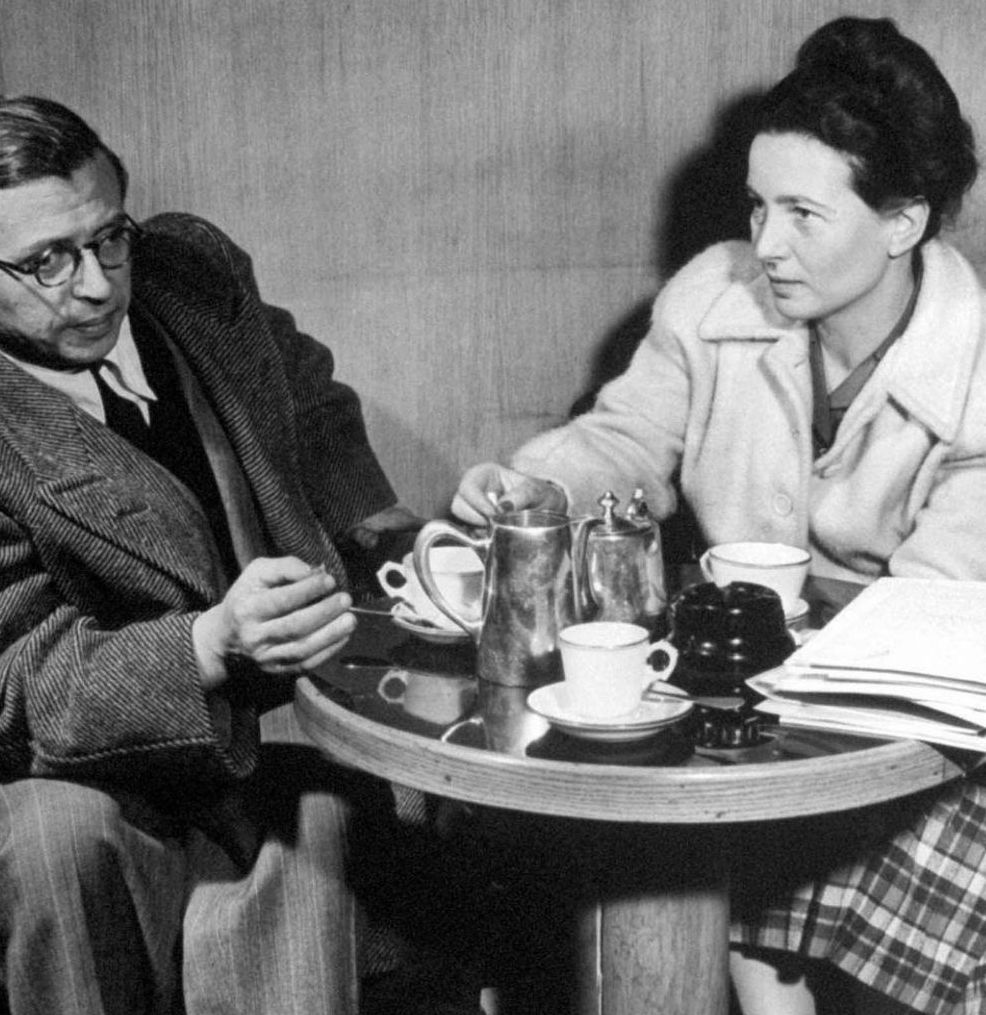 Simone de Beauvoir (1908-1986) was a French existentialist philosopher, writer, and political activist. During her studies she met Jean-Paul Sartre and the two became life-long friends, intellectual companions, as well as lovers who maintained an open erotic relationship. She wrote many novels and essays, and was also involved in the French women’s liberation movement. She died of pneumonia at the age of 78, and was buried next to Sartre in Paris.
Simone de Beauvoir (1908-1986) was a French existentialist philosopher, writer, and political activist. During her studies she met Jean-Paul Sartre and the two became life-long friends, intellectual companions, as well as lovers who maintained an open erotic relationship. She wrote many novels and essays, and was also involved in the French women’s liberation movement. She died of pneumonia at the age of 78, and was buried next to Sartre in Paris.
The following text is adapted from Simon de Beauvoir’s famous book The Second Sex (1949), an influential philosophical work on woman’s condition. A major theme in this book is that woman has been shaped by society to become an Other – defined not by herself but in relation to man, as being the creature who is different from man, as the “second” sex. She has also been forced to give up her subjectivity, her “transcendence” – the human capacity to go beyond the facts and freely give meaning and value to things in life.
All this applies to sexuality too. Differences between man’s sexuality and woman’s sexuality are not the result of biological factors but of complex social processes which shape woman and her sexuality. Of course, biological differences exist, but the crucial question is how society interprets and treats these differences. De Beauvoir analyzes in detail the development of these two sexualities, and the following text contains a few examples of the process. Whether or not we accept her specific analysis, on a more general level she offers a provocative idea: that your sexuality is not simply the result of your personal tastes or urges, but of social factors that shape your identity and sexuality.
From Book 2, Chapter 12: Childhood
One is not born a woman, but rather becomes a woman. No biological, psychological, or economic fate determines the character of the human female in society. Civilization as a whole produces this creature who is between male and eunuch, and who is described as feminine. Only the intervention of somebody else can establish an individual as an Other.
[…]
Anatomically, the boy’s penis is suitable for this role. It projects free from the body and seems like a little natural toy, a kind of puppet. Adults will give value to the boy, then, when they give value to his “double” [his penis with which he identifies]. […] For the little girl, things are very different. Mothers and nurses feel no reverence or tenderness toward her genitals. They do not direct her attention toward that secret organ, invisible except for its covering, that cannot be grasped by hand. In a sense, she has no sex organ. She does not experience this absence as a lack; evidently, her body is quite complete for her. But she finds herself situated in the world differently from the boy, and a constellation of factors can transform this difference, in her eyes, into an inferiority.
[…]
Thus, the passivity that is the characteristic of the “femenine” woman develops in her from the earliest years. But it is wrong to assert that a biological fact is concerned. It is, in fact, a destiny imposed upon her by her teachers and society. The great advantage enjoyed by the boy is that his mode of existence in relation to others leads him to assert his subjective freedom. […] In woman, on the contrary, there is from the beginning a conflict between her autonomous existence and her objective self, her “being-the-Other.” She is taught that to please she must try to please, she must make herself an object. She should therefore renounce her autonomy. She is treated like a live doll and is refused liberty.
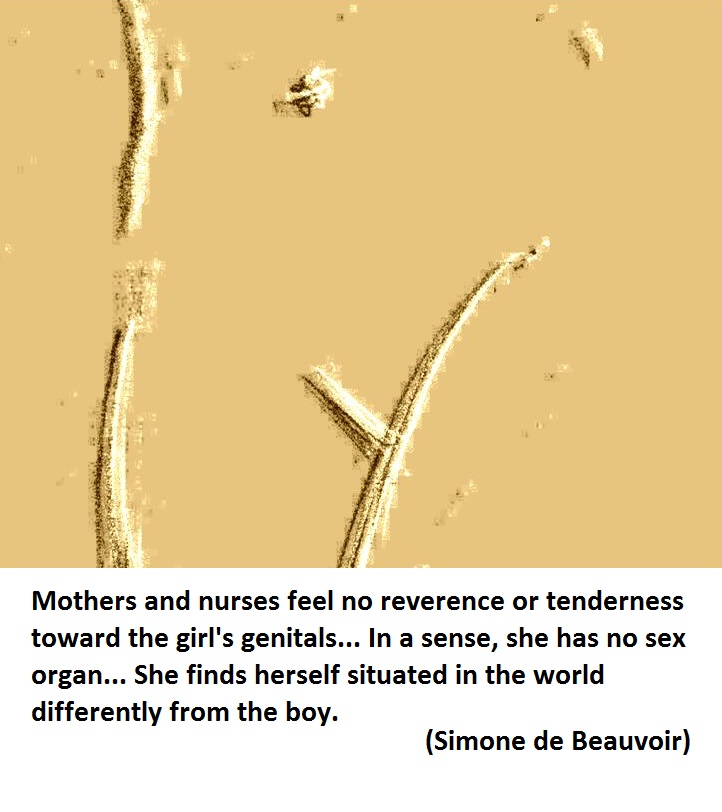
From Chapter 14: Sexual initiation
Sexual pleasure in woman, as I have said, is a kind of magic spell. It demands a complete letting go. […] She longs to abolish the separateness that exists between her and her male. She longs to melt with him into one. As we have seen, she longs to remain subject while she is made object. Since she is more profoundly beside herself than man, since her whole body is moved by desire and excitement, she retains her subjectivity only through union with her partner. Giving and receiving must combine in both of them. If the man limits himself to taking without giving, or if he gives pleasure without receiving, the woman feels that she is being maneuvered, used. Once she realizes herself as the Other, she becomes his non-essential Other, and then she has to deny her otherness.
This explains the fact that the moment when the two bodies separate is almost always distressing for the woman. After coition, the man always dis-owns the flesh, regardless of whether he feels happy or depressed, the victim of nature or the conqueror of woman. He becomes once more an honest body. He wants to sleep, take a bath, smoke a cigarette, go out for fresh air. The woman wants to prolong the bodily contact […] “Was it enough? You want more? Was it good?” – the fact that he asks such questions emphasizes the separation, it changes the act of love into a mechanical operation directed by the male. And that is, indeed, why he asks them. He really seeks domination much more than fusion and mutuality.
[…]
The erotic experience dramatically reveals to human beings the ambiguity of their condition. Through it they are aware of themselves as flesh and as spirit, as the Other and as the subject. The conflict has a more dramatic shape for woman, because at first she feels herself to be object and she does not immediately realize a sure independence in sex enjoyment. She must regain her dignity as a transcendent and free subject, while assuming her bodily condition – this enterprise is full of difficulty and danger, and it often fails. But the difficulty of her position protects her from the traps into which the male easily falls. He is an easy victim of the deceptive privileges given to him by his aggressive role, and by the lonely satisfaction of the orgasm. He hesitates to see himself fully as flesh. Woman lives her love more authentically.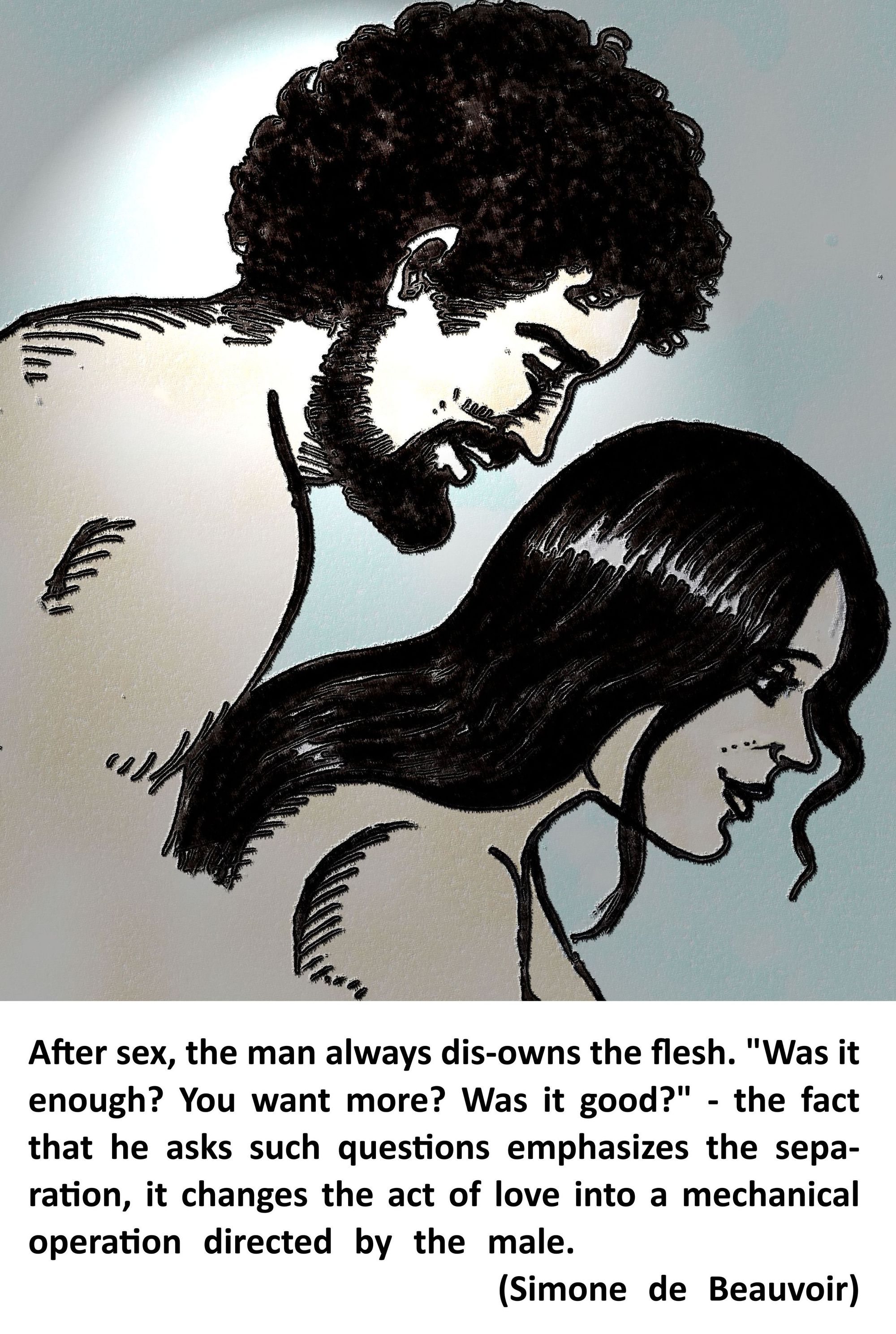
GEORGES BATAILLE
Sexuality as death
 Georges Bataille (1897-1962) was a French intellectual who wrote many essays in philosophy and other fields. He studied at École Nationale des Chartes in Paris, and then worked occasionally as a librarian. He published extensively, founded several journals and literary groups, and at different stages was interested in different approaches to philosophy and art. He often wrote essays, novels, and poems on socially “inappropriate” topics such as torture, pornography, and bodily fluids. He died at the age of 64 from malfunction of blood-arteries in the brain. After his death his writings had a considerable influence on important thinkers.
Georges Bataille (1897-1962) was a French intellectual who wrote many essays in philosophy and other fields. He studied at École Nationale des Chartes in Paris, and then worked occasionally as a librarian. He published extensively, founded several journals and literary groups, and at different stages was interested in different approaches to philosophy and art. He often wrote essays, novels, and poems on socially “inappropriate” topics such as torture, pornography, and bodily fluids. He died at the age of 64 from malfunction of blood-arteries in the brain. After his death his writings had a considerable influence on important thinkers.
The following text is adapted (and slightly simplified) from Bataille’s book Eroticism, Death, and Sensuality (originally published under the title L’Erotisme in 1957). Here Bataille develops the idea that sexuality is intimately related to death. (Likewise, taboo, violence, and transgression are related to death). Normally we are “discontinuous” – in other words, there is a separation between you and me and him and her. When we die, we become “continuous” with the rest of the world, since we return to the elements and no longer have a separate identity. In sexual activity we seek to merge with the other, and in the ecstasy and climax we lose our separate identity. In this sense, sexuality is a disintegration of our “discontinuity,” and it is therefore a movement towards death. This is why Bataille suggests that the sexual act involves a “crisis” – the experience of death-like sexual ecstasy.
From the Introduction
We are discontinuous beings, individuals who perish in isolation in the middle of an incomprehensible adventure, but we yearn for our lost continuity. We find the situation of our random and brief individuality hard to bear. Side by side with our tormenting desire that this temporary life would last, we are also obsessed with a primordial continuity that would link us with everything that exists.
[…]
The whole business of eroticism is to destroy the self-contained character of the lovers as they are in their normal lives. Stripping naked is the decisive action. Nakedness contrasts with self-possession, in other words with discontinuous existence. It is a state of communication that reveals a quest for a possible continuation of being beyond the boundaries of the self. Bodies open out to a state of continuity through secret channels that give us a feeling of obscenity. Obscenity is our name for the uneasiness which upsets the physical state associated with self-possession, with the possession of a recognized and stable individuality.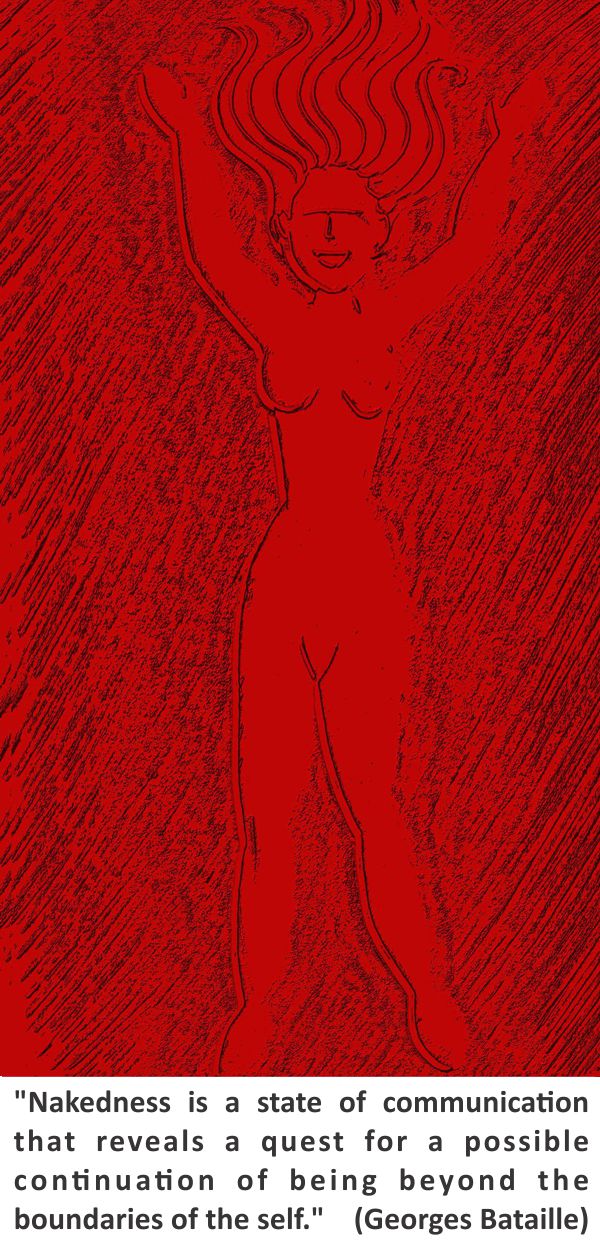
From Chapter 9: Sexual Plethora and Death
Sexual activity is a critical moment in the isolation of the individual. We know it from the outside, but we know that it weakens the feeling of self and calls it into question. I am using the word “crisis” – the inner effect of an event that is known objectively. As an objective fact of knowledge, the crisis is nevertheless responsible for a basic inner phenomenon.
[…]
For the animal, the only possible modification of individual discontinuity is death. Either the animal dies or else when the tumult has died down, its discontinuity remains intact. In human life, on the other hand, sexual violence causes a wound that rarely heals by itself. It has to be closed, and it will not remain closed without constant attention based on anguish. Primary anguish when linked with sexual disturbance signifies death. The violence of this disturbance re-opens in the mind of the person experiencing it (who also knows what death is) the abyss that death once revealed. The violence of death and sexual violence, when they are linked together, have this dual significance. On the one hand, the convulsions of the body are more acute when they are near to a black-out, and on the other hand a black-out, as long as there is enough time, makes physical pleasure more exquisite. Mortal anguish does not necessarily lead to sensual pleasure, but that pleasure is more deeply felt during mortal anguish.Erotic activity is not always as openly sinister as this, it is not always a crack in the system. But secretly, and at the deepest level, the crack belongs intimately to human sensuality and is the driving force of pleasure. Fear of dying makes us catch our breath, and in the same way we suffocate at the moment of crisis. In principle, eroticism seems at first sight the very opposite of this horrifying paradox. It is a plethora of the genital organs. An animal impulse in us is the cause of the crisis. But the organs do not freely enter this state of chance. It cannot take place without the consent of our will. It upsets an ordered system on which our efficiency and reputation depend. In fact, the individual splits up and his unity is shattered from the first instant of the sexual crisis. Just then the plethoric life of the body comes up against the mind's resistance. Even an apparent harmony is not enough; beyond consent, the convulsions of the body demand silence and the spirit's absence. The physical urge is curiously foreign to human life, loosed without reference to it so long as it remains silent and keeps away.
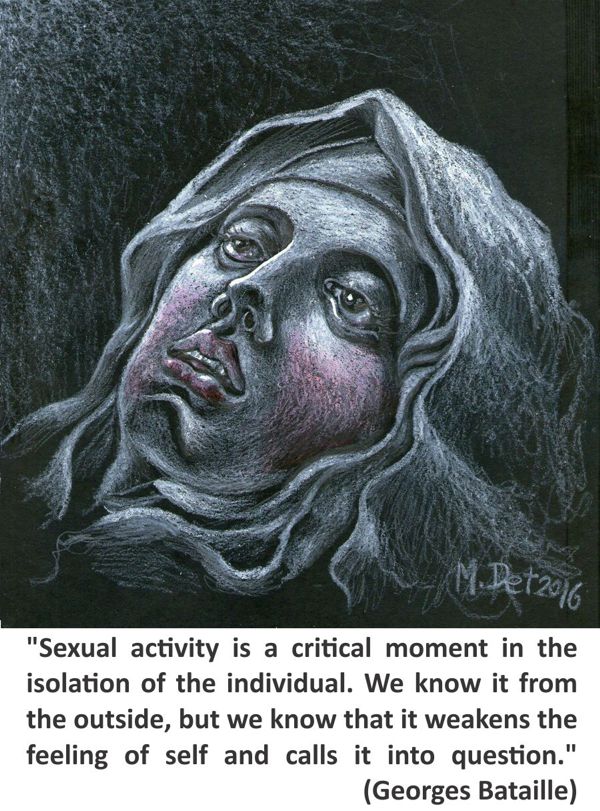
- Authenticity
